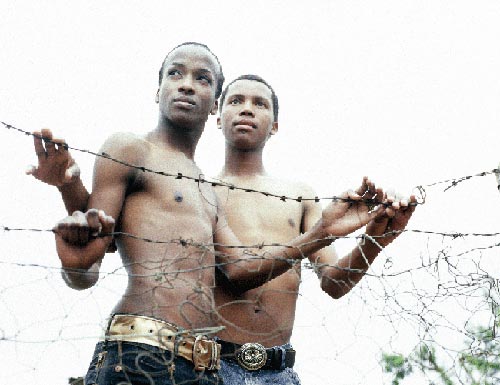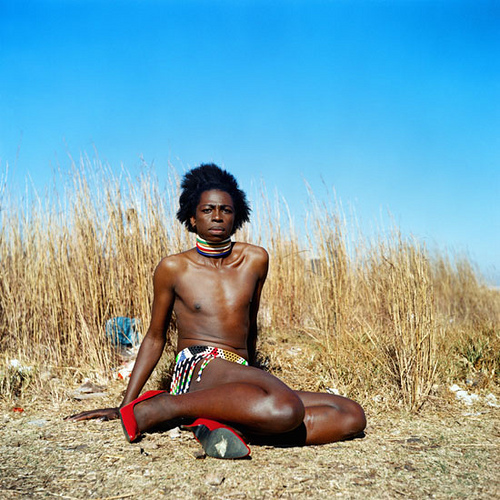Quote of the week
[T]he moral point of the matter is never reached by calling what happened by the name of ‘genocide’ or by counting the many millions of victims: extermination of whole peoples had happened before in antiquity, as well as in modern colonization. It is reached only when we realize this happened within the frame of a legal order and that the cornerstone of this ‘new law’ consisted of the command ‘Thou shall kill,’ not thy enemy but innocent people who were not even potentially dangerous, and not for any reason of necessity but, on the contrary, even against all military and other utilitarian calculations. … And these deeds were not committed by outlaws, monsters, or raving sadists, but by the most respected members of respectable society.
Eichmann in Jerusalem: A Report on The Banality of Evil
No blood-filled dreams of dread
Today is “International Day Against Homophobia and Transphobia”. To mark this day several religious leaders, including Laurie Gaum, Bishop David Russel and Dean Rowen Smith, have called on South Africans to honour the Constitution and have signed a memorandum on the role of “religious fundamentalism and patriarchy” that have caused an increase in homophobia in South Africa in the past few months. The religious leaders referred to increased homophobia on the content and attempts to pass legislation permitting the death sentence for gay people.

The statement comes in the wake of the rape and murder of many lesbians in South Africans over the past few years. This includes the gang rape and brutal killing of Eudy Simelane, former star of South Africa’s Banyana Banyana national female football squad. Simelane was found in a creek in a park in Kwa Thema, on the outskirts of Johannesburg and had been brutally beaten before being stabbed 25 times in the face, chest and legs. As well as being one of South Africa’s best-known female footballers, Simelane was a voracious equality rights campaigner and one of the first women to live openly as a lesbian in Kwa Thema.
Our Constitution prohibits discrimination against gay men and lesbians and over the past 16 years the judges of the Constitutional Court (bless their souls) have steadily extended the same rights accorded to heterosexuals and their relationships to gay men and lesbians and our relationships. In fact, same-sex couples have slightly more rights than heterosexual couples because some of the rights enjoyed by same-sex married couples were extended to non-married same-sex couples before the passing of the Civil Union Act. These rights did not automatically fall away when marriage rights were extended to same-sex couples.
Despite this wonderful legal protection, many gay men, lesbians and trangendered South Africans live in fear. We can be ridiculed, attacked, or even killed merely because we are different from the “ideal citizen” postulated by our colonial masters. This homophobia stems from fear, ignorance and a misplaced endorsement of patriarchy and the perverted morality of right-wing religious groups.
As Susan Sontag remarked, the traditional Judeo-Christian view of morality (thankfully not shared by all Christians), centres almost exclusively on sex and sexual acts. To be viewed as moral within this tradition is either to abstain from sex (as Priests are supposed to do but clearly often do not) or to contain sexual thoughts and acts within the “safe” confines of a patriarchal heterosexual marriage – to be whispered and sniggered about but never to be admitted in polite company.
A world in which poverty, homelessness, hunger and racial discrimination thrives while we live in mansions in Sandton and wear R250 00 watches is viewed as regrettable, but it is not seen as a morally perverse world in serious need of change. We drive, without another thought, past a hungry child begging on a street corner but shout out in horror when we hear that child is selling his or her body to make ends meet. It is said, after all, that the poor will always be with us. But, alas far too many people think that gay men and lesbians can be “corrected” through therapy or – in extreme cases – rape.
According to this extremely perverted notion of morality, if two consenting adult men or women love each other and have sex with one another, this becomes a perversion that threatens the very existence of Christian morality (the so called “moral fabric” of our society) and is seen as far more problematic than the social and economic deprivation that robs people of their dignity and sometimes their lives. (On a lighter note, I have always wondered what this “moral fabric” might be and have speculated that maybe it is the fabric used to make wedding dresses from.)
Ironically this deeply entrenched Western view of sex and morality was brought to Africa by missionaries and imperialists and has been embraced all over Africa by new rulers and citizens. Often wrongly claiming that a more permissive view on sexuality is “un-African”, many Africans embrace the very homophobia that was imported to Africa by our colonial masters. Those who hold this view do not realise that their minds have been colonised by the imperialists and that they are merely endorsing the kind of hateful views put in their heads by our erstwhile oppressors.
When the Minister of Arts and Culture, Lulu Xingwana, storms out of an exhibition of photographs of Zanele Muholi (see photographs above and below) in disgust because the pictures are viewed as “pornographic” she is displaying for all to see, how her mind has been colonised by her erstwhile oppressors. Xingwana, it will be recalled, said that: “Our mandate is to promote social cohesion and nation-building. I left the exhibition because it expressed the very opposite of this. It was immoral, offensive and going against nation-building.”

This nation she talks about is a nation who must be built in the image of the ertswhile white colonial oppressor: one that is filled with “pure”, heterosexual, individuals who endorse the patriarchal values of a bygone era, one in which men are men and women know their place and where the individuality and diversity of society is repressed and stamped out in order to exert a deeply oppressive social control over the desires and dreams of ordinary citizens.
What is “un-African”, of course, is not homosexuality, but homophobia. Although different communities in Africa have dealt with same-sex sexuality differently (some accommodating it through according the men and women who were “different” a special role in their societies and other repressing or ignoring such desires and impulses), the notion of “the homosexual” that could be vilified, discriminated against, harassed, raped and murdered did not exist in pre-colonial Africa. It was a concept brought to Africa and along with this concept came the inevitable homophobia now masquerading as African values and cultural traditions.
We have a long way to go to ensure that the legal rights enjoyed by gay men, lesbians and transgendered South Africans are translated into a better life of dignity and respect for all South Africans who do not conform to an outmoded and perverted notion of what is normal and acceptable. The hatred and violence experienced by many gay men and lesbians (especially those who are not rich and cannot afford to live in leafy suburbs where they go to dinner parties and gay clubs) will not disappear before we begin to free our minds of the colonialist ideas about morality.
Sadly, our politicians either remain quiet about this or through their silence or their remarks they endorse the hateful homophobia that contributes to the harassment and violence of gay men and lesbians. How many political parties will issue a statement today condemning homophobia and celebrating the rights of a significant, yet often hated and vilified, minority in South Africa?
Until our leaders speak out about homophobia, the rape and the killing will continue. And like PW Botha, they will sleep soundly at night because they obviously do not take their conscience with them to bed. Unlike Lady MacBeth there will be no blood-filled dreams of dread.
BACK TO TOP

